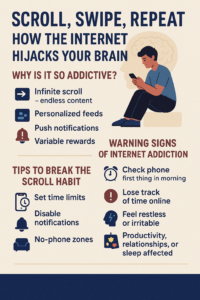Scroll, Swipe, Repeat: How the Internet Hijacks Your Brain
 Do you ever pick up your phone just to check the time—and suddenly, it’s 45 minutes later, and you’re deep into Instagram reels or YouTube shorts? You’re not alone.
Do you ever pick up your phone just to check the time—and suddenly, it’s 45 minutes later, and you’re deep into Instagram reels or YouTube shorts? You’re not alone.
In today’s digital age, internet addiction is becoming one of the most common behavioral problems, especially among teenagers and working adults. The apps we use every day are designed to keep us scrolling—and they’re really good at it.
🧠 Why Is It So Addictive?
The answer lies in neuroscience. Every time you get a like, message, or new content recommendation, your brain releases dopamine—the same chemical involved in gambling or drug use.
Apps are built using psychology:
-
Infinite scroll makes it hard to stop.
-
Personalized feeds keep your interests engaged.
-
Push notifications trigger fear of missing out (FOMO).
-
Variable rewards (not knowing what you’ll see next) keep you hooked—like a slot machine.
These are not just time-wasters—they can slowly lead to emotional burnout, poor sleep, anxiety, and distracted relationships.
🚩 Warning Signs of Internet Addiction
You might be struggling if:
-
You check your phone first thing in the morning and last thing at night.
-
You lose track of time online—especially with games, videos, or social media.
-
You feel restless or irritable when not connected.
-
Your productivity, relationships, or sleep are affected.
🛠️ Simple Tips to Break the Scroll Habit
-
Set time limits: Use built-in tools like Digital Wellbeing (Android) or Screen Time (iOS) to limit app usage.
-
Disable notifications: Silence non-essential alerts. You decide when to check, not the app.
-
No-phone zones: Create tech-free spaces (like dining table or bedroom).
-
Use grayscale mode: Reduces visual stimulation and makes scrolling less tempting.
-
Schedule digital breaks: 1-hour daily, 1 day a week (digital detox Sundays work wonders).
📖 Real-Life Example
Take Rajesh, a 25-year-old software engineer in Chennai. He noticed that his screen time had shot up to 9 hours a day, mostly on Instagram and YouTube. He was sleeping late, waking tired, and missing deadlines.
With some support, he:
-
Installed usage trackers,
-
Started journaling offline,
-
Practiced digital fasting after 8 PM.
Within a month, his sleep improved and his mood stabilized. Behavioral addictions don’t require rehab centers to fix—they need awareness, small habits, and accountability.
👨⚕️ Need Help to Regain Control?
If you’re stuck in a cycle of scroll, guilt, repeat—you’re not weak or lazy. You’re facing a behavioral addiction.
Therapy can help. Approaches like CBT, digital detox planning, and behavioral restructuring are proven to work.
📍 If You’re in Chennai and Need Support
If you’re in Chennai and struggling with internet, phone, or gaming addiction, help is just one step away.
📞 Book a confidential consultation today:
Dr. Srinivas Rajkumar T
Consultant Psychiatrist
📍Apollo Clinic – Velachery & Tambaram, Chennai
📧 srinivasaiims@gmail.com
📱 85951 55808
Take back control of your time, focus, and peace of mind.
Your attention is your most valuable asset—protect it.